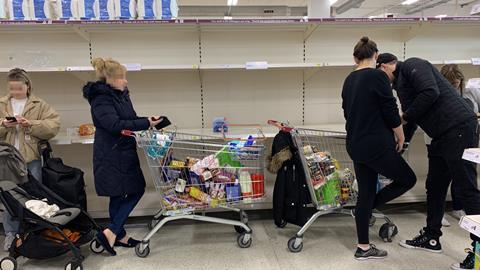
Sainsbury’s boss Mike Coupe has warned that long queues could be here to stay for months as the grocer said it expects profits to take a £500m hit from coronavirus (The Telegraph). The boss of Sainsbury’s has said disruption from the coronavirus outbreak will last until at least mid-September, and that physically distanced queues are likely to remain “for the foreseeable future” (The Guardian). Sainsbury’s says that customers are likely to see disruption to their shopping until September amid the coronavirus pandemic (The BBC).
Panic-buying sent Sainsbury’s food sales soaring but the chain has put off a decision on its dividend until the autumn after warning that extra costs will hit profits by £500m and disruption will last another five months (The Times £). Sainsbury’s deferred a decision on whether to pay its dividend until later in the year and axed bonuses for senior management amid a cautious outlook for its non-food business in particular (The Financial Times £). Sainsbury’s has deferred a £160million dividend and cancelled bonuses despite its supermarkets being ‘busier than Christmas’ in the week before lockdown (The Daily Mail). Sainsbury’s expects to take a £500m hit to annual profits due to the cost of keeping open during the pandemic - and may have to close some stores if the situation worsens (Sky News).
Amazon emerged as one of the big winners of the coronavirus pandemic on Thursday, announcing it had revenues of $75.4bn in the first three months of the year – over $33m an hour (The Guardian). Amazon sales surged in the first three months of the year, as the coronavirus lockdown boosted demand for the firm’s groceries, online marketplace and cloud computing services (The BBC).
Keeping Amazon workers healthy and products moving could cost an additional $4bn or more in the next quarter, the company warned, wiping out any gain from a jump in sales as the coronavirus pandemic puts stresses on its vast network (The Financial Times £). Amazon’s quarterly sales soared as coronavirus lockdowns forced millions to shop online but its chief executive warned that Covid-19 protection measures could wipe out its second-quarter profit (The Times £).
Reckitt Benckiser has posted record sales growth for the first quarter and signalled it will beat expectations for the year after the coronavirus crisis led to surging demand for its Dettol and Lysol disinfectants and Mucinex cold medicine (The Financial Times £). Strong sales of disinfectants and medicines ahead of government lockdowns helped Reckitt Benckiser to post what is thought to be its strongest sales growth since its merger two decades ago (The Times £). Stockpiling of Dettol, Nurofen and Lemsip put a rocket under sales at Reckitt Benckiser as the consumer goods giant surged to record revenues (The Telegraph).
Britons are having less sex because of the virus lockdown, according to the maker of Durex condoms (The Daily Mail). Laxman Narasimhan said condom sales fell in most markets, including the UK, during March as lockdowns limited opportunities for sexual activity (The BBC).
Greggs has reversed a plan to reopen 20 of its bakery shops next week after an enthusiastic response on social media prompted fears they would be overcrowded with customers (The Financial Times £). Baker and takeaway chain Greggs has changed its mind about reopening 20 shops next week, fearing crowds of customers could gather (The Guardian, Sky News).
The maker of Dunhill and Lucky Strike cigarettes expects industry volumes and revenue growth to weaken in its second quarter and the launch of some of its new products to be delayed. (The Times £)
The coronavirus pandemic will “vastly accelerate” the decline of the British high street, where the number of shops could more than halve in the next two years, MPs have been told. (The Guardian)
UK retailers are increasingly falling between the cracks of various government support schemes, with large companies facing stringent credit rating criteria and banks still reluctant to lend to smaller ones (The Financial Times £).
Ending the Government’s near-£50billion wage subsidy scheme in June is ‘tantamount to economic suicide’ as firms will be forced to make mass redundancies without further help, according to business leaders. (The Daily Mail)
The founder of Iceland has launched a furious attack on HM Revenue and Customs for “harassing” his business over a scheme intended to allow staff to save money for Christmas. (The Times £)
The head of Whitbread, Alison Brittain, is leaving the board of Marks & Spencer after six years and the retailer has recruited two female non-executive directors. (The Times £)
Coronavirus lockdowns have given a boost to the global sales of processed food brands – Kraft Heinz disclosed its biggest rise in quarterly sales since the mega-deal that created it, while Kellogg said demand for its cereals leapt 40% in the US in March as shoppers turned to old cupboard staples. (The Financial Times £)
The drinks group behind Magners cider and Tennent’s lager has scrapped the dividend and cut salaries for workers and senior management as part of a continuing attack on costs. (The Times £)
Illycaffè, the Italian family-owned coffee maker, has enjoyed a more than doubling of online sales in key markets including Italy, the US and China during the coronavirus outbreak but signalled caution for the year ahead. (The Financial Times £)
McDonald’s has missed Wall Street estimates for quarterly profit despite the fact that many of its 39,000 restaurants are open again. (The Times £)
Belgians have been asked to eat more fries, the British are being urged to tuck into steak and the French have been pressed to up their cheese intake. The unusual pleas come not because people need comfort food as the coronavirus pandemic rages, but to help clear a glut of produce languishing in storage as the crisis shuts restaurants, hotels and workplace eateries across Europe. (The Financial Times £)







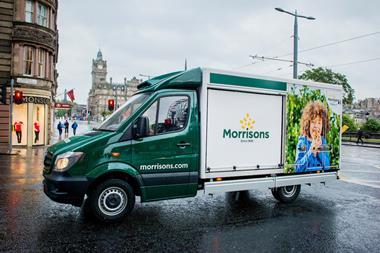
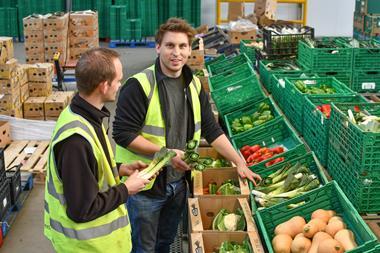
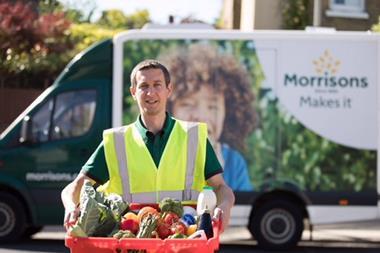
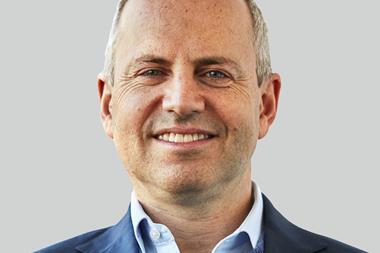
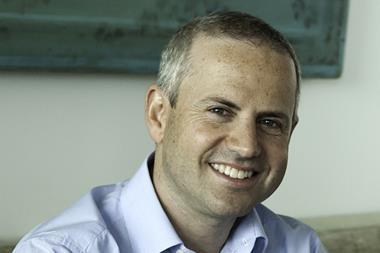
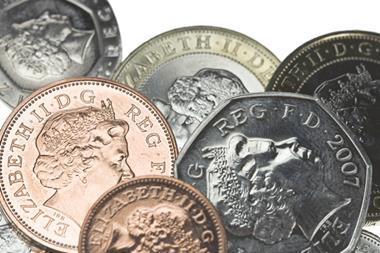






No comments yet